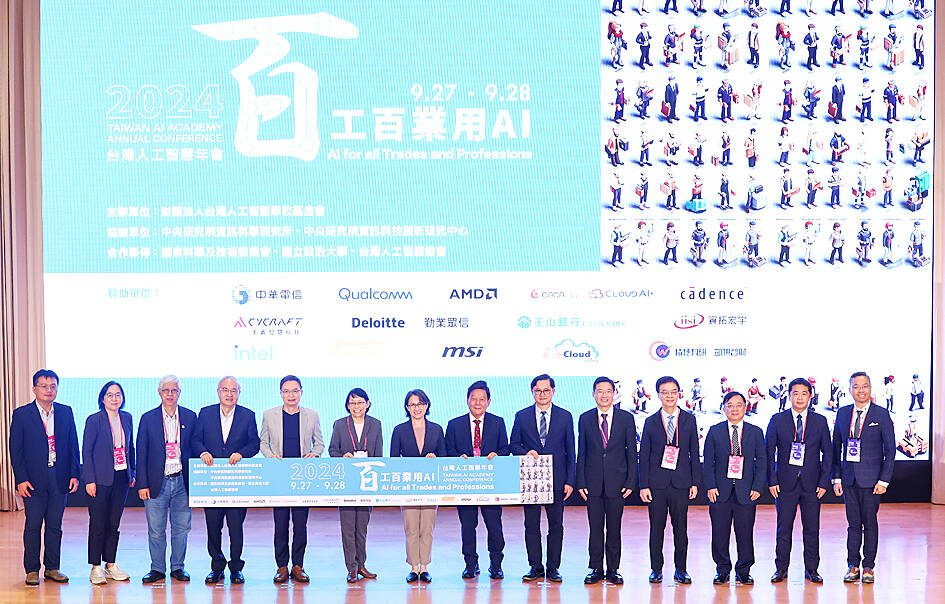In the artificial intelligence (AI) era, enterprises and nations already at the top might get stronger, but “Taiwan still has plenty of advantages with its excellence in hardware manufacturing,” the head of a technology company told a forum in Taipei yesterday.
AI will be immersed in people’s daily life as the Internet has become in the past 30 years, Pegatron Corp (和碩) chairman Tung Tzu-hsien (童子賢) said at the Taiwan AI Academy Annual Conference.
“But different from the Internet age, which saw disruptions [in terms of market share] in the tech industry, AI would likely only make those who are already strong stronger, be they enterprises or countries,” he said.

Photo: CNA
That is because AI development requires massive amounts of electricity and computing power, he said.
“Educational institutions, enterprises or nations without the needed funding would simply lose their initiative,” he added.
For example, developing a large language model such as Open AI’s GPT-4 requires US$78 million for its training, and US$190 million for Google’s Gemini Ultra, Tung said.
The massive use of computational power and electricity has seen Open AI’s Sam Altman invest in nuclear companies and Microsoft Corp strike a deal to restart a reactor at the Three Mile Island plant in Pennsylvania, said Tung, who has advocated retaining nuclear power in Taiwan.
The cost of the needed computational power for AI infrastructure, which has to be bolstered by a sufficient supply of energy and highly advanced chips, is extraordinarily high.
“So even Apple has decided to withdraw from developing AI infrastructure, and redirected its strategy to partner with OpenAI and integrate ChatGPT into the operating systems for its devices,” Tung said. “This also tells us that as long as you have a strong grip on the market and the platform, you might not necessarily be the underdog in the AI-dominant world.”
For Tung, Taiwan’s semiconductor and hardware manufacturing sectors are likewise in an advantageous position.
As AI would be used widely in all kinds of applications and industries, Taiwan is expected to not only gain in cloud equipment, but also edge devices such as personal computers and smartphones, which would all be transformed to support AI operations, he said.
“The overall output value of Taiwan’s semiconductor industry is expected to hit NT$5.3 trillion [US$167.26 billion] this year, which is even higher than the NT$4.8 trillion estimated at the end of 2023,” which was said to be a new high, he said, attributing the growth to the AI boom.
He said that when Open AI was founded in 2015, the average age of the three founders was 29, “but what they have created would not have been possible without the chips made by Taiwan Semiconductor Manufacturing Co (台積電) founded by the now 92-year-old Morris Chang (張忠謀).”
The same applies to electric vehicles (EVs), Tung said.
“Taiwan actually lags behind in the use of EVs, with an adoption rate of less than 10 percent, but as Taiwan is strong in manufacturing electronic parts and components, it can still be a good partner for the world’s main vehicle brands,” he said.

CHAOS: Iranians took to the streets playing celebratory music after reports of Khamenei’s death on Saturday, while mourners also gathered in Tehran yesterday Iranian Supreme Leader Ayatollah Ali Khamenei was killed in a major attack on Iran launched by Israel and the US, throwing the future of the Islamic republic into doubt and raising the risk of regional instability. Iranian state television and the state-run IRNA news agency announced the 86-year-old’s death early yesterday. US President Donald Trump said it gave Iranians their “greatest chance” to “take back” their country. The announcements came after a joint US and Israeli aerial bombardment that targeted Iranian military and governmental sites. Trump said the “heavy and pinpoint bombing” would continue through the week or as long

TRUST: The KMT said it respected the US’ timing and considerations, and hoped it would continue to honor its commitments to helping Taiwan bolster its defenses and deterrence US President Donald Trump is delaying a multibillion-dollar arms sale to Taiwan to ensure his visit to Beijing is successful, a New York Times report said. The weapons sales package has stalled in the US Department of State, the report said, citing US officials it did not identify. The White House has told agencies not to push forward ahead of Trump’s meeting with Chinese President Xi Jinping (習近平), it said. The two last month held a phone call to discuss trade and geopolitical flashpoints ahead of the summit. Xi raised the Taiwan issue and urged the US to handle arms sales to

BIG SPENDERS: Foreign investors bought the most Taiwan equities since 2005, signaling confidence that an AI boom would continue to benefit chipmakers Taiwan Semiconductor Manufacturing Co’s (TSMC, 台積電) market capitalization swelled to US$2 trillion for the first time following a 4.25 percent rally in its American depositary receipts (ADR) overnight, putting the world’s biggest contract chipmaker sixth on the list of the world’s biggest companies by market capitalization, just behind Amazon.com Inc. The site CompaniesMarketcap.com ranked TSMC ahead of Saudi Aramco and Meta Platforms Inc. The Taiwanese company’s ADRs on Tuesday surged to US$385.75 on the New York Stock Exchange, as strong demand for artificial intelligence (AI) applications led to chip supply constraints and boost revenue growth to record-breaking levels. Each TSMC ADR represents

Pro-democracy media tycoon Jimmy Lai’s (黎智英) fraud conviction and prison sentence were yesterday overturned by a Hong Kong court, in a surprise legal decision that comes soon after Lai was jailed for 20 years on a separate national security charge. Judges Jeremy Poon (潘兆初), Anthea Pang (彭寶琴) and Derek Pang (彭偉昌) said in the judgement that they allowed the appeal from Lai, and another defendant in the case, to proceed, as a lower court judge had “erred.” “The Court of Appeal gave them leave to appeal against their conviction, allowed their appeals, quashed the convictions and set aside the sentences,” the judges